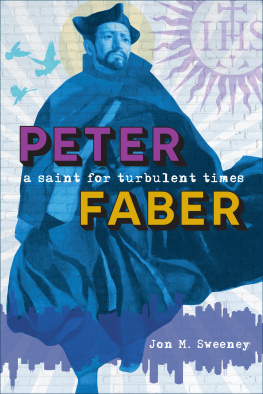Mary Purcell - The Quiet Companion: The Life of Peter Faber (Peter Favre S.J., 1506-1546)
Here you can read online Mary Purcell - The Quiet Companion: The Life of Peter Faber (Peter Favre S.J., 1506-1546) full text of the book (entire story) in english for free. Download pdf and epub, get meaning, cover and reviews about this ebook. year: 2014, publisher: Loyola Press, genre: Detective and thriller. Description of the work, (preface) as well as reviews are available. Best literature library LitArk.com created for fans of good reading and offers a wide selection of genres:
Romance novel
Science fiction
Adventure
Detective
Science
History
Home and family
Prose
Art
Politics
Computer
Non-fiction
Religion
Business
Children
Humor
Choose a favorite category and find really read worthwhile books. Enjoy immersion in the world of imagination, feel the emotions of the characters or learn something new for yourself, make an fascinating discovery.

- Book:The Quiet Companion: The Life of Peter Faber (Peter Favre S.J., 1506-1546)
- Author:
- Publisher:Loyola Press
- Genre:
- Year:2014
- Rating:5 / 5
- Favourites:Add to favourites
- Your mark:
- 100
- 1
- 2
- 3
- 4
- 5
The Quiet Companion: The Life of Peter Faber (Peter Favre S.J., 1506-1546): summary, description and annotation
We offer to read an annotation, description, summary or preface (depends on what the author of the book "The Quiet Companion: The Life of Peter Faber (Peter Favre S.J., 1506-1546)" wrote himself). If you haven't found the necessary information about the book — write in the comments, we will try to find it.
Mary Purcell: author's other books
Who wrote The Quiet Companion: The Life of Peter Faber (Peter Favre S.J., 1506-1546)? Find out the surname, the name of the author of the book and a list of all author's works by series.
The Quiet Companion: The Life of Peter Faber (Peter Favre S.J., 1506-1546) — read online for free the complete book (whole text) full work
Below is the text of the book, divided by pages. System saving the place of the last page read, allows you to conveniently read the book "The Quiet Companion: The Life of Peter Faber (Peter Favre S.J., 1506-1546)" online for free, without having to search again every time where you left off. Put a bookmark, and you can go to the page where you finished reading at any time.
Font size:
Interval:
Bookmark:

When the news came that Pope Francis would canonize Pierre Favre, SJaka Peter Favre, aka Peter Fabermany Jesuits probably said, Finally!
But for many Catholics and certainly most Christians, the response was probably, Who?
For Peter Faber has been a Blessed since... 1872.
His canonization, however, shouldnt be a surprise. In the popes interview in America magazine in 2013, he singled out for praise the man often called the Second Jesuit. The interviewer asked the first Jesuit pope the reason behind his well-known devotion to this First Companion of St. Ignatius of Loyola.
[Peter Fabers] dialogue with all, said the pope, even the most remote and even with his opponents; his simple piety, a certain navet perhaps, his being available straightaway, his careful interior discernment, the fact that he was a man capable of great and strong decisions but also capable of being so gentle and loving.
As Mary Purcell relates in this lovely biography, Faber spent a great deal of his Jesuit life working among Protestants during the at once explosive and delicate time of the Reformation; and, as the pope intimated, Faber always did so with great openness and charityduring a time when they were called heretics. One of my favorite quotes from Faberno, my favoriteis: Take care, take care, never to close your heart to anyone.
Faber was said by St. Ignatius Loyola, the founder of the Society of Jesus, to be the man best suited to direct others in the Spiritual Exercises, the famous plan for a four-week retreat that marks Ignatiuss greatest gift to humanity. That comment alone should be enough to recommend Faber to the Church at large. And indeed, many Jesuits are devoted to this humble spiritual master: in the past few years the Jesuit residence at Boston College for men in formation was named after himthough they may now have to sandblast the Blessed on the stone sign in front of the house.
But, surprisingly, Fabers story is not nearly as well known as those of his two famous college room-mates, Ignatius and St. Francis Xavier. (Yes, the three were room-mates at the University of Paris.) When I once asked an elderly Jesuit why Faber was still a Blessed and not yet a saint, even after the passage of so many years, he said, Even in heaven he is humble! He doesnt want to place himself on par with Ignatius and Xavier.
For some time, then, Faber has languished in ecclesial obscurity. Indeed, that so many writers cant even agree on a standard way of referring to the manyou will see, variously, the original French Pierre Favre, the somewhat modified Anglo-French Peter Favre, and the totally Anglicized Peter Faberis an indication of the lack of attention given him.
His canonization changes all that. And like most Jesuits, Im delighted that Peter Faber will be more widely known throughout the universal church. Because like most Jesuits, I have a special place in my heart for him.
Im also delighted that The Quiet Companion is being reissued by Loyola Press. I read it first as a Jesuit novice, and the story of the humble Faber made a deep impression on me. It is still the best general introduction to his life in the English language. I return to the book every few years and am always moved.
Even as a novice, I realized that Faber was much more the kind of Jesuit I could hope to be. Clearly Im not called to found a religious order like Ignatius! And apart from a few years in East Africa, I havent been called to work overseas in the missions like Francis Xavier. But the call to be a humble person open to listening to others was something I could surely aspire toand still do. One day I hope to be as good a Jesuit, as good a Christian, as good a person as Peter Faber was.
Until then, I can say, now with the whole Church... Saint Peter Faber, pray for us.
James Martin, SJ, author of My Life with the Saints and The Jesuit Guide to (Almost) Everything
Peter Faber and Francis Xavier, room-mates at Paris University from 1525 to 1536, were the foundation stones upon which Ignatius Loyola built the Society of Jesus. The gentle and retiring Faber packed into the last seven of his forty years an incredible programme of travel and work. He was the Paris theologian in the retinue of the Emperor Charles V at Worms, Spires, Ratisbon and other cities where Lutherans and Catholics met for discussions that usually ended in futility and mutual recriminations.
During the fateful years preceding the Council of Trent, Fabers assignments brought him into contact with many famous contemporaries. His writings supply interesting sidelights on the situation in Germany, particularly in the Rhineland, and stamp him as an ecumenist born four centuries too soon; his observations on men and events were perceptive and tolerant. A humanist by formation, he pleaded for calm instead of fury, conciliation instead of condemnation, and concentration on moral reform rather than on theological controversy. In 1540 Peter Faber was saying, with little hope of being heeded, what Pope John said in 1960: Stress what brings men together, not that which divides them. He told those who sought his counsel that the religious situation in the sixteenth century was quite different from that of early Christian times. The primitive Church preached to pagans, the policy being to bring them first to belief and afterwards to a better moral life. The correct procedure in post-Renaissance Europe was, Faber held, for the Church to set her own house in order, for self-reform, individual and collective; then, purified and renewed, the faithful, by example and kindness, might endeavour to win back those who had left the fold.
In a letter to a Jesuit friend who asked his advice on how to deal with men who had abandoned Catholicism for newer religions, Faber reveals himself. This letter, written shortly before his death in 1546, answered the query:
Remember, if we want to be of help to them, we must be careful to regard them with love, to love them in deed and in truth, and to banish from our own souls any thought that might lessen our love and esteem for them.
We have to win their good will so that they will love us and readily confide in us. This can be done by speaking familiarly with them on subjects about which we agree, and by avoiding points of discussion that might give rise to argument; for argument usually ends in one side lording it over the other. Neither should we act towards the Lutherans as though they were pagans, but rather address ourselves to a mans will, to his heart, as a means of approaching with prudence matters of faith.
Before mentioning errors of belief, try to get those who are in bad faith and who are, at the same time, leading evil lives, to abandon their vices. I once visited a Lutheran who wanted to draw me into a discussion on priestly celibacy. I set myself out to win his confidence. Then he told me that for many years he himself was living with a woman. Little by little I persuaded him to give up that life and return to his former celibacy. Meanwhile I refrained from disputing matters of faith. As soon as he ceased sinning, his errors of faith vanished and he never even mentioned them again, they being nothing more than the result of the kind of life he had been leading.
Regarding good works, which the Lutherans say are not necessary, proceed ab ipsis operibus ad ipsam fidem, and always speak of the things that will rouse them to good works... try to move their souls, so that they will develop a liking for prayer, for good works, for the Mass. It is the loss of love for prayer that has caused many to lose the faith. Assure them that with the grace of God it is possible to keep the commandments and bear the trials of life. This is one point where ardent exhortation is needed to help them recover the hope and confidence they have lost. If Luther could be got to abandon his position and place himself once more under obedience, resuming the habit he has cast off, he would by that very act cease to be a heretic and there would be no need for further theological dispute. But, oh, what fortitude of spirit, what profound humility, what tremendous patience, what heavenly fire would be needed to bring that to pass...
Font size:
Interval:
Bookmark:
Similar books «The Quiet Companion: The Life of Peter Faber (Peter Favre S.J., 1506-1546)»
Look at similar books to The Quiet Companion: The Life of Peter Faber (Peter Favre S.J., 1506-1546). We have selected literature similar in name and meaning in the hope of providing readers with more options to find new, interesting, not yet read works.
Discussion, reviews of the book The Quiet Companion: The Life of Peter Faber (Peter Favre S.J., 1506-1546) and just readers' own opinions. Leave your comments, write what you think about the work, its meaning or the main characters. Specify what exactly you liked and what you didn't like, and why you think so.











